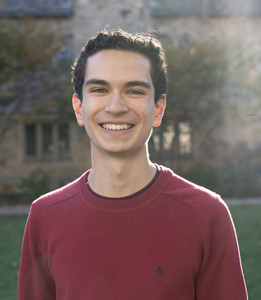Splash Biography
GUI PEREIRA, Junior studying Linguistics
|
Major: Linguistics College/Employer: Yale Year of Graduation: 2026 |

|
Brief Biographical Sketch:
Gui is a junior at Yale majoring in Linguistics. Originally from Brazil, he moved to the wondrous state of New Jersey in 2017 with his parents and his sister. Outside of classes, Gui is a member of two singing ensembles, the Yale Glee Club and Redhot & Blue, and he also translates for the Yale Interpretation Network. Past Classes(Clicking a class title will bring you to the course's section of the corresponding course catalog)X4831: Transcribing the Sounds of Language in Splash Spring 2024 (Apr. 06, 2024)
Our writing system is not very good at representing the sounds of English. The words “though” and “thought” have no consonant or vowel sounds in common, yet we write them with almost the same sequence of letters. If we want to accurately represent sounds found in English and in languages around the world, we need some other system. In this class, we will learn the basics of transcribing language sounds in the most widely used system in Linguistics: the International Phonetic Alphabet (IPA).
H4821: Many Englishes in One: Exploring Linguistic Variation in English in Splash Fall 2023 (Nov. 11, 2023)
An English speaker who grew up in Connecticut is not very likely to speak the same way as one who grew up in Kentucky. In other words, there is not just one “American English.” But this is about more than just accents and vocabulary—there are real differences even in the structure of sentences that speakers of different English varieties might say. In this class, we will uncover the rich tapestry of "Englishes" spoken in the United States and around the world, examining the many ways in which the grammar and lexicon of a language can vary within and across communities.
H4724: The Rhetoric of April Fools in Splash Spring 2023 (Apr. 01, 2023)
This is a class about ancient philosophy! Just kidding. But the topic we’ll explore together—verbal pranking on April Fools’ Day and what makes a prank successful—intersects in many ways with the art of rhetoric that Aristotle most famously theorized: it involves convincing, influencing into belief or disbelief. We’ll look at several April Fools’ Day pranks and the factors that contribute to their rhetorical success or failure. We’ll look at the motivation of pranksters, the techniques they use, and what these pranks, whether well crafted or less so, can tell us about the art of convincing.
|
|
